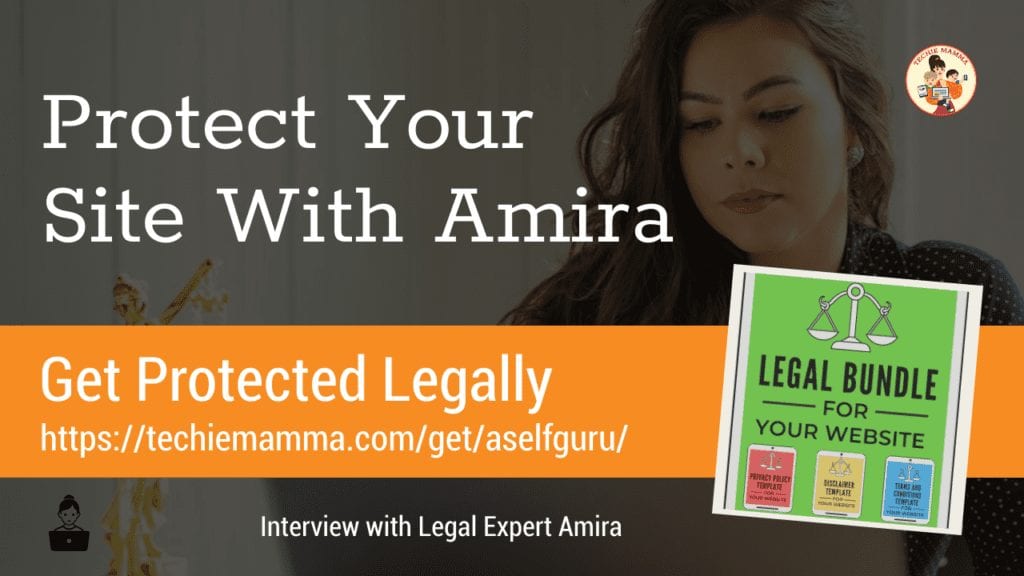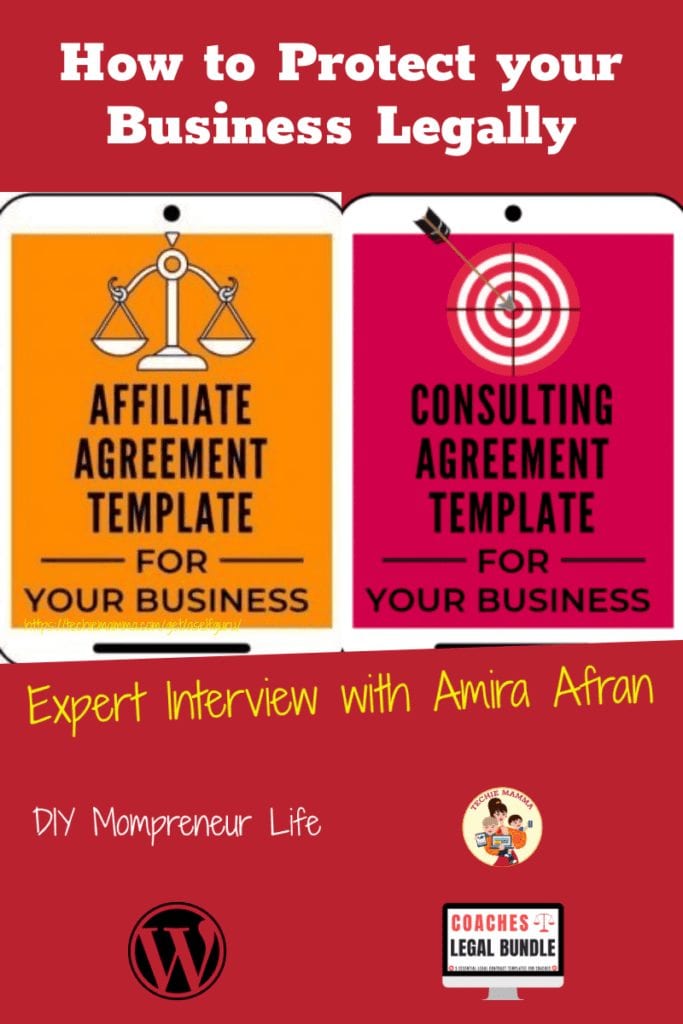There are so many things to think about when you start a new website! From the hosting and your domain name to the purpose and your audience. One thing though that often gets overlooked or ignored is the legal aspect of your blog. The ramifications of ignoring this piece of the puzzle is huge. From one day to another you can be blogging and then be sued for misuse. I am not sure about you but that is super anxiety driving for me. I think in starting a blog whether for a business or a hobby there should be three costs associated and factored in:
- cost of domain (usually about $12 / year)
- cost of hosting (can range from $3 / month to $50 or more per month)
- cost of legal templates and documents ($197 one time fee)
There can be more costs such as a theme or plugins but I would say these are the first costs that everyone should consider. The first two are a requirement to have anything on the web and the last one should also be a requirement before publishing anything as there are serious consequences if these pages don’t exist.
I interviewed Amira Afran and asked her all the best practices when it comes to having a legal blog that won’t end up in a lawsuit of ninety thousand dollar lawsuit.
Featured Interview with Amira
What are the most important legal pages that every website should have?

That’s a great question. So every single website should have like three main legal pages and they’re all for different reasons. So the first one is called a privacy policy. Do you want me to kind of give a brief overview as to where it would be? Right. OK. So a privacy policy is like a legal document on your Web site, which is legally required. So I want to make it very clear, because a lot of people assume, like, oh, I don’t need a privacy policy or whatever.
But you are legally required to have one. That is the first legal page. It basically tells your website visitors or your customers that what information you’re collecting from them and how are you going to use it? Because think about it. You know, I come to your Website, I give you my name, my email, or even if I don’t do any of that, I still visit your Website. You’re collecting my IP address.
You’re collecting some data from me. Now, I have a legal right to know what are you going to do with that information, you know, and how are you going to use it? Because it identifies me, especially if I’m giving you my name and email and things like that. So that’s why it’s lawfully required. And then the second legal page you need is what’s called a disclaimer. So a disclaimer also includes your affiliate disclosures, like under the Federal Trade Commission, you are legally required to give disclosures if you’re using affiliate links.
So affiliate links, you know, if you don’t know, it is a way to make money. Affiliate marketing is when you promote other people’s products. So let’s say I love your product and I want to promote it. And I put your, you know, put my affiliate link. I’m going to get a commission if someone purchases through my link. But now I’m legally required to also disclose to the people that are waiting and purchasing and that, hey, this is an affiliate link.
I’m going to earn a small commission and no extra costs to you. Things like that, that’s what’s called affiliate disclosure. And your disclaimer page needs to outline all of that stuff. Plus give a disclaimer, because even though you’re promoting someone else’s products, I’m sure you don’t want to be legally held responsible for it.
So once they once they land on your site, they go to someone else’s Website. You want to disclaim liability. You want to make it clear that, hey, not only on my Website, but your bound by this other person’s privacy policy, terms and conditions can vary. So that’s why this page is so important. Because not only you’re satisfying the legal requirement, right, the under the Federal Trade Commission. And they, by the way, they audit the audit and they find people for not complying.
So. The second thing is that you’re also limiting your liability. Your legal liability for the content that you publish. So you’re giving you know, you’re doing a public service. You’re helping people out with all kinds of information on your Website. Well, what if that information can be used against you? Right.
People can rely on it and be like, oh, I so-and-so said that I acted on it and now I suffered a side effect or bad effect. Now what I’m after you for, you know, damages. So that’s what that disclaimer page does. So I hope it’s clear, like why it’s so important. And I know a lot people don’t say that.
[convertkit form=1668701]
What about GDPR? That’s for the EU, right?
Yes. GDPR applies to regardless of where you are. If you have people from the European Union, EU, visiting your website, which I’m pretty sure you do, because if your website is global. Right. And so GDPR is European Union’s, you know, data protection law. So you are legally required to make sure that your website is GDPR compliant. Because if you have people from the EU, there are certain rules and regulations that you need to abide by.
Otherwise, there are serious GDPR non-compliance fines. I mean billions of dollars. And so it’s not even worth the risk. Doesn’t matter if you’re in the US. It doesn’t matter if you’re outside the US. If you have people from the EU visiting, you’re going to need to comply. And a couple of ways to do that is through your email marketing. You want to make sure that, you know, the opt-in forms or GDPR compliant.
And then you’ll also. The second way you do that is through the privacy policy on your website. Because of GDPR you need to give people clear information on how they can opt in, how they can unsubscribe and things like that. And then plus people from the GDPR have certain legal rights that you need to outline in your privacy policy to make it look right to them that, you know, this is what we’re doing and these are your rights to people from the EU.

Is the US going to have laws like GDPR?
Yeah. So recently, like in January of this year, CCPA, you may have heard about it, the California Consumer Protection Law. That one is very similar to the GDPR. But like you said, yes. So it also basically put more requirements on people. Now, people from California have certain rights, you know. And so you not only need to make your website GDPR compliant, but you also need to make your website CCPA compliant.
That’s the thing with laws, right?
They’re always changing and there is always new information. And you never know. Tomorrow, another state could implement a similar law. And it’s very possible because that’s what usually happens. You know, one state passes a law and the others follow. So. Yeah. So that’s what you need to do with CCPA as well. You know, it has different requirements. And same thing. Your privacy policy needs a section on people now from California visiting your website.
And that’s why it’s so crucial to have a privacy policy written by a lawyer. Because this way, you don’t have to worry about this stuff because honestly, how else are you going to know? Unless you’re literally sitting there, which I highly doubt, that you are meeting up all this information and then trying to make sense of it and then try to compose the legalese. I mean, it’s a lot of work. It’s a lot of work for even as a lawyer.
Right. So I can only imagine if it’s not your expertise. So better to just get a template from someone like me or somebody else to just make sure that you’re covered. And this way, the good thing about my templates is that if you purchase anything from me, you get free updates.
What is the best way to get photos for my blog, searching on Google is okay, right?
That’s a big no. I know so many clients. Some of my clients. They have paid a hefty price for just going on Google and taking any photo. I’m talking like the last client was like eight thousand dollars that she had to pay. So that’s a big, big, big copyright violation. And that’s a big mistake people make, especially if they don’t know that you just can’t take any photo. There’s something called copyright laws, any content, any photos, any videos, anything that you create.
You have automatic copyright protection. So you can’t just take people’s photos and you just can’t take people’s, you know, videos or quotes or anything without their permission. So even if you find something, the first step is that you need to seek permission that if you can use that or not. And let’s say you’re an affiliate marketer and you are part of someone’s affiliate program, then read their terms and conditions, you know, the affiliate agreement to see what’s allowed.
What can you do with your product images? I mean, in those instances, I’m pretty sure they allow you to use their product images because they want you to promote their product.
So that’s a different story. But let’s say aside from that, you know, like if you’re. But even then, you want to first check their terms and conditions to make sure you know, legally use their photos the way they want you to. And you’re not violating their policies. But other than that, it’s you should not be going on Google and just taking any photo. Trust me. Trust me. I see it all the time.
Clients get notices, cease and desist letters again, and they get big fines, and then they get sued. And it’s just not, it’s not worth it. So what you should do is look at royalty free Websites like Pixabay, Unsplash. I’m sure there’s so many others. And make sure that they allow you to download photos for free and read their license every time you are on any of these websites. They all have terms and conditions.
Again, goes back to what I was talking about. Why a terms and conditions is important because they all outline what you can do and cannot do with your photos and information on their Website. So you want to just read that quickly, at least look at it to make sure you’re not, you know, running into any issues. But there’s so many Websites out there. Shutterstock is a paid one, you know, Deposit Photos and things like that.
So there’s so many websites that allow you to get photos without getting into legal trouble. So go for those options rather than just Googling and downloading anything.
[convertkit form=1668701]
Free or Lawyer Created Templates
Amira is a full time lawyer. Blogging is her side gig. Purchasing legal templates through Amira you know that she is up to date on the law and that if the law changes (which it does all the time) she will have updates to the templates. You are legally protecting yourself, it is so important to have the right language and clauses to make sure that something doesn’t get through the cracks and end up in a much more expensive lawsuit. Amira mentioned one of her clients having a lawsuit of nine thousand dollars for misuse of an image.
Other Considerations
In the full interview, Amira talks about contracts and other disclaimers and disclosures that can be used for your website. Are you a freelancer or coach? Having a contract that protects you (and your client) is a necessity. Don’t make the common mistake of not having a contract and forgoing money that should be yours because you didn’t have a simple signature.
GDPR, CCPA, and the Legal Alphabet Soup
As mentioned in the interview, GDPR is focused on the European Union, but the US is heading in that direction. Privacy is becoming more and more of a hot issue. The best practice is to put things in place for GDPR even if your audience is 100% form the US, which is not likely. In order to be compliant with GDPR there needs to be a cookie consent listing all the tracking codes you have on your website. If that was Greek to you, make sure you have a proper plugin that will do all the work for you. Tracking codes are things like Google Analytics, anything that saves any kind of small amount of data on your site. A great plugin to help out is called GDPR Cookie Consent, that allows you to add a banner for consent and keeps track of all of your cookies.
The Legal Documents Checklist
First, make sure you have three basic legal documents to take care of things, a Privacy Policy, Disclaimer, and Terms and Conditions. Next, if you work with clients, have a membership site, have a coaching program, do sponsored posts, or have an affiliate program make sure you have additional documents or contracts to take care of these situations.
Lastly, in order to be GDPR compliant, have a cookie policy notification for your website visitors to agree to before continuing on the website.
[convertkit form=1668701]




 BY TECHIE MAMMA
BY TECHIE MAMMA